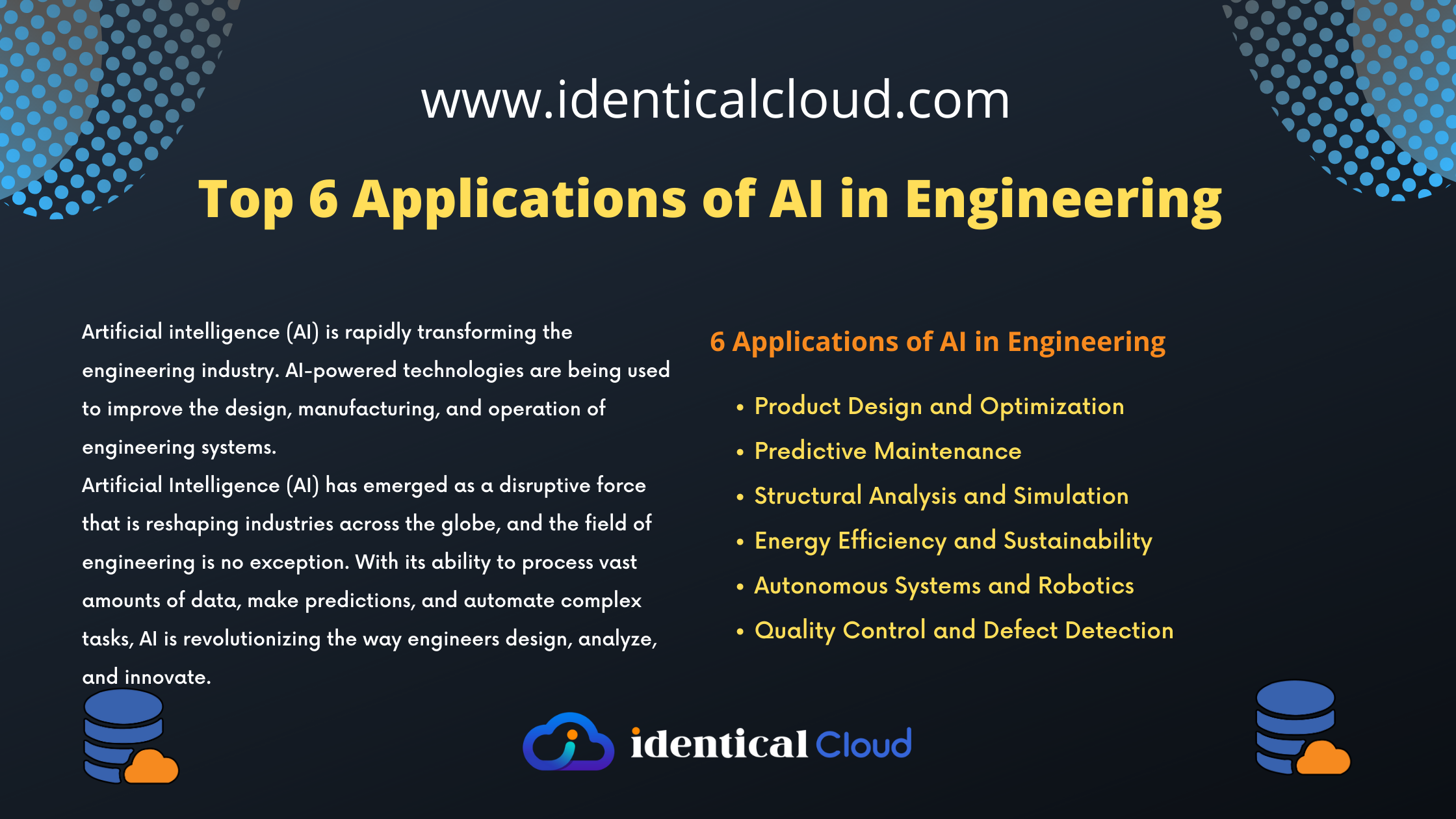
Top 6 Applications of AI in Engineering
Top 6 Applications of AI in Engineering
Artificial intelligence (AI) is rapidly transforming the engineering industry. AI-powered technologies are being used to improve the design, manufacturing, and operation of engineering systems.
Artificial Intelligence (AI) has emerged as a disruptive force that is reshaping industries across the globe, and the field of engineering is no exception. With its ability to process vast amounts of data, make predictions, and automate complex tasks, AI is revolutionizing the way engineers design, analyze, and innovate.
In this blog, we delve into the top six applications of AI in engineering, showcasing how this technology is driving efficiency, precision, and creativity.
Product Design and Optimization
AI-powered design tools are enabling engineers to explore a multitude of design possibilities rapidly. Generative design algorithms use AI to create and evaluate numerous design iterations based on specified parameters. This process accelerates innovation, leading to lighter, stronger, and more efficient products. Engineers can input design constraints, and AI algorithms generate optimized solutions that human designers might not have considered.
Predictive Maintenance
AI-driven predictive maintenance has revolutionized equipment maintenance strategies. By analyzing real-time sensor data from machinery, AI algorithms can predict when equipment is likely to fail. This enables proactive maintenance, reducing downtime, minimizing repair costs, and optimizing the lifecycle of critical assets.
Structural Analysis and Simulation
AI is enhancing the accuracy and efficiency of structural analysis and simulation. Machine learning algorithms can predict how structures will behave under different conditions, helping engineers optimize designs and materials. AI can also speed up simulation processes, enabling rapid testing of design variations.
Energy Efficiency and Sustainability
AI plays a vital role in optimizing energy consumption and enhancing sustainability in engineering projects. AI algorithms can analyze energy usage patterns, identify inefficiencies, and suggest improvements to reduce energy consumption. Engineers can design more eco-friendly buildings, industrial processes, and transportation systems with AI-powered insights.
Autonomous Systems and Robotics
AI is driving advancements in robotics and autonomous systems. Engineers are developing AI-powered robots capable of performing complex tasks in various industries, from manufacturing to agriculture. These robots can navigate environments, make decisions, and adapt to changing conditions, enhancing productivity and safety.
Quality Control and Defect Detection
AI-based vision systems are transforming quality control processes in manufacturing. Machine learning algorithms can analyze images and identify defects or deviations from quality standards in real time. This technology ensures consistency and accuracy in production processes, reducing waste and improving product quality.
These are just a few of the many ways that AI is being used in engineering. As AI technology continues to develop, we can expect to see even more innovative applications in the years to come.
How AI is Changing the Engineering Industry
AI is changing the engineering industry in a number of ways. Here are some of the most notable changes:
- Increased efficiency. AI-powered technologies can automate tasks that were once done manually, which can free up engineers to focus on more creative and strategic work.
- Improved accuracy. AI can analyze data more accurately than humans, which can lead to better decision-making.
- Reduced risk. AI can help to identify potential problems before they occur, which can help to reduce risk and improve safety.
- New possibilities. AI is opening up new possibilities for engineering, such as the development of autonomous systems and new materials.
The Future of AI in Engineering
The future of AI in engineering is bright. As AI technology continues to develop, we can expect to see even more innovative applications in the years to come. AI has the potential to revolutionize the engineering industry, making it more efficient, accurate, and safe.
The marriage of AI and engineering is ushering in a new era of innovation, efficiency, and problem-solving. From designing optimized products to predicting maintenance needs and advancing robotics, the applications of AI in engineering are diverse and impactful. As engineers harness the power of AI, they are unlocking new levels of creativity and pushing the boundaries of what is possible. With AI as a steadfast ally, the future of engineering holds the promise of more sustainable, efficient, and groundbreaking solutions that will shape industries and improve lives.







